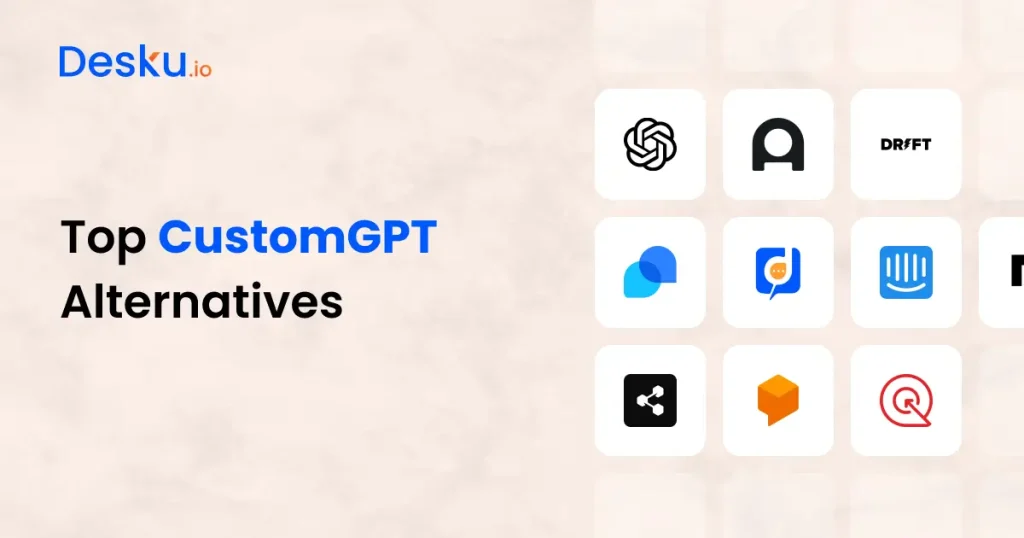Finding the right AI chatbot platform can transform the way businesses handle customer interactions. For many companies, CustomGPT has been a top choice, thanks to its use of advanced large language models and no-code capabilities. But it’s not the only option out there.
Whether you’re in customer support, e-commerce, or managing customer service operations, a reliable chatbot can handle customer questions, automate repetitive tasks, and deliver personalized customer experiences. As businesses continue to prioritize customer satisfaction, it’s essential to consider key features like natural language processing, integration capabilities, and customization options when evaluating alternatives.
This guide covers the best 10 CustomGPT alternatives, highlighting their advanced features, seamless integration options, and ability to work with custom data. We’ll also look at how they cater to specific business needs, such as automating customer inquiries, engaging customers on multiple channels like Facebook Messenger and Microsoft Teams, or using an internal knowledge base to provide accurate responses.
Criteria for Selection
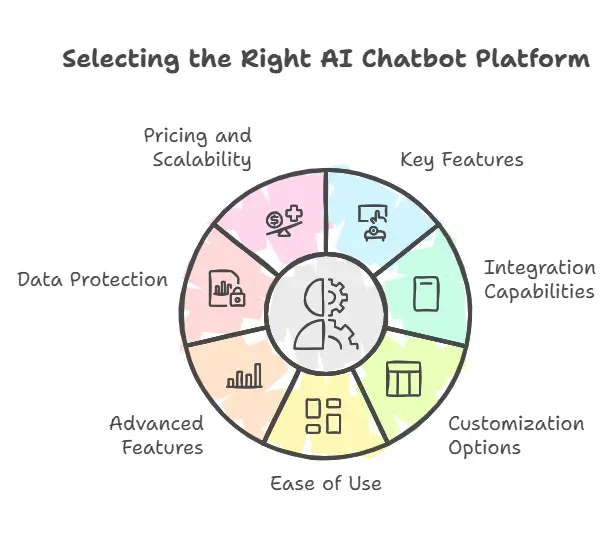
Choosing the right CustomGPT alternative requires evaluating several key factors to ensure the platform meets your specific business needs. Not all AI chatbot platforms are created equal, and businesses must prioritize features that enhance customer satisfaction while aligning with their goals. Here’s what to look for:
1. Key Features
The foundation of any great chatbot lies in its ability to leverage advanced large language models and natural language processing. Look for platforms that offer human-like interactions, relevant responses, and the ability to handle complex customer questions with precision.
2. Integration Capabilities
A chatbot must integrate smoothly into your ecosystem, whether you use Microsoft Teams, Google Drive, or Facebook Messenger. Platforms with seamless integration ensure uninterrupted workflows and improved chatbot performance.
3. Customization Options
Every business has unique requirements. Whether it’s incorporating your brand’s voice, training with custom data, or enabling personalized interactions, customization is critical to creating tailored solutions for customer support teams.
4. Ease of Use
A user-friendly interface with no-code capabilities allows teams to quickly set up and manage their bots without technical expertise. This is especially important for SMBs and e-commerce businesses.
5. Advanced Features
Leading platforms include tools like advanced analytics for tracking bot effectiveness, AI capabilities for automating repetitive tasks, and multilingual support to reach a global audience.
6. Data Protection
Data security is non-negotiable. Ensure the platform uses industry standards for data protection, especially when working with custom data or sensitive training data.
7. Pricing and Scalability
Finally, consider the cost of ownership. Many platforms offer a free plan or premium plan, but it’s essential to choose one that aligns with your budget and can scale as your business grows.
By focusing on these factors, businesses can find an AI chatbot that not only meets their current requirements but also adapts to future challenges.
Comparison Table
To help you quickly compare these CustomGPT alternatives, here’s a side-by-side breakdown of their key features, suitability, and pricing:
| Platform | Key Features | Best For | Pricing | Unique Selling Point |
|---|---|---|---|---|
| Desku | No-code capabilities, relevant responses, repetitive tasks | E-commerce, SMBs | Free plan, starting at $29 per month | design and focus on enhancing customer experience |
| ChatGPT | GPT-powered, APIs, human-like interactions | SaaS, SMBs, customer service teams | Free plan, $20+/mo | Versatile AI with advanced language capabilities |
| Ada | Multilingual, analytics, personalization | Customer support teams, enterprises | Custom pricing | Tailored experiences with automation at scale |
| Drift | Lead qualification, hybrid chatbots, analytics | SaaS, sales teams | Custom pricing | Combines sales focus with conversational AI |
| Tidio | Pre-built templates, multi-channel support | SMBs, e-commerce | Free plan, $19+/mo | Affordable and easy to set up |
| Intercom | Conversational support, lead gen, integrations | SaaS, mid-sized enterprises | Custom pricing | Blends automation with human interaction |
| Botpress | Open-source, customizable workflows | SaaS, large enterprises | Free, enterprise pricing | Full control for developers and advanced users |
| Dialogflow | NLP-powered, voice + text, Google integrations | SaaS, global businesses | Pay-as-you-go | Seamless Google ecosystem integration |
| Zoho SalesIQ | AI bots, visitor tracking, real-time engagement | SMBs, e-commerce | Free plan, premium plans | Combines lead generation with customer support |
| ManyChat | Social media focus, analytics, personalized chats | E-commerce, social marketers | Free plan, $15+/mo | Specialized for messaging apps and social platforms |
This table provides a quick overview of the key factors to consider when choosing the right platform for your specific business. Each option has its strengths, whether it’s scalability, advanced features, or affordability.
Top 10 CustomGPT Alternatives
1. Desku
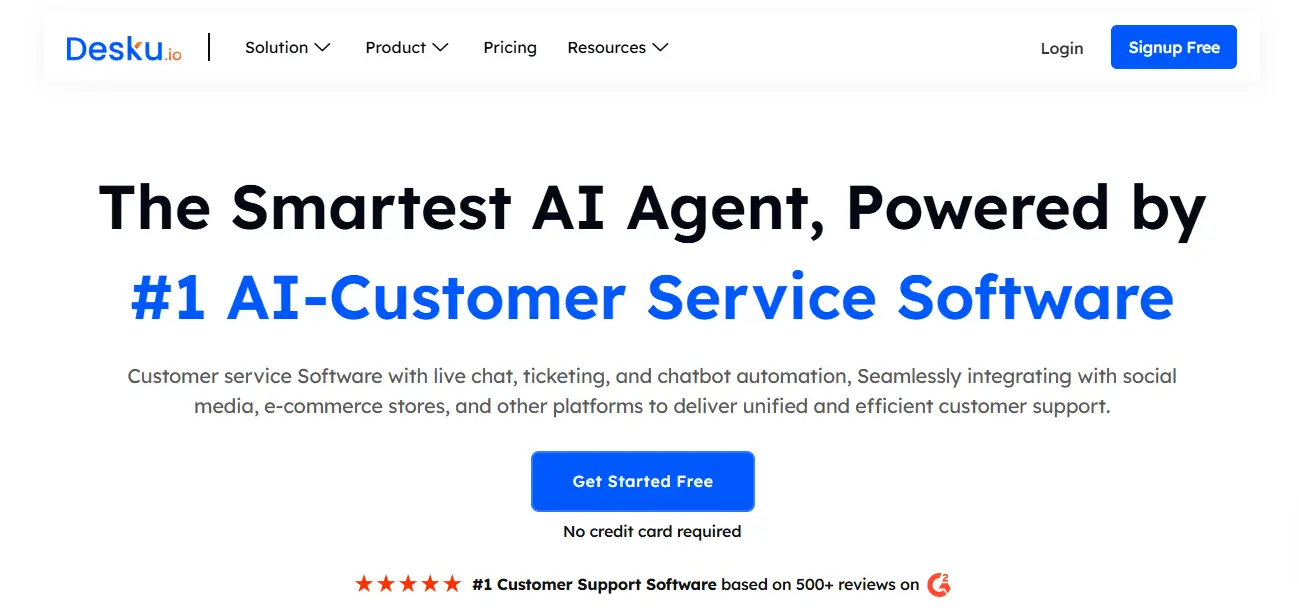
Desku is an all-in-one AI chatbot platform designed to enhance customer interactions and improve customer service operations. With its focus on automation and personalized customer experiences, Desku empowers businesses to handle customer inquiries efficiently across multiple channels.
Key Features
- No-code capabilities for quick chatbot setup.
- Centralized internal knowledge base for consistent answers.
- Multi-channel support, including websites, Facebook Messenger, and email.
- Tools for automating repetitive tasks and providing relevant responses.
Pros
- Easy-to-use user-friendly interface.
- Affordable options for small to mid-sized businesses.
Cons
- Advanced analytics require higher-tier plans.
Suitable For
Ideal for SMBs, e-commerce businesses, and customer support teams looking to automate processes while maintaining a personal touch.
Pricing
Desku offers a free plan, with paid options starting at $29 per month.
Integration Capabilities
Seamlessly integrates with platforms like Shopify, WordPress, and CRMs, enabling businesses to adapt the chatbot to their specific business needs.
Unique Selling Point
Desku’s intuitive design and focus on enhancing customer experience make it a perfect fit for businesses seeking a balance of functionality and affordability.
2. ChatGPT by OpenAI
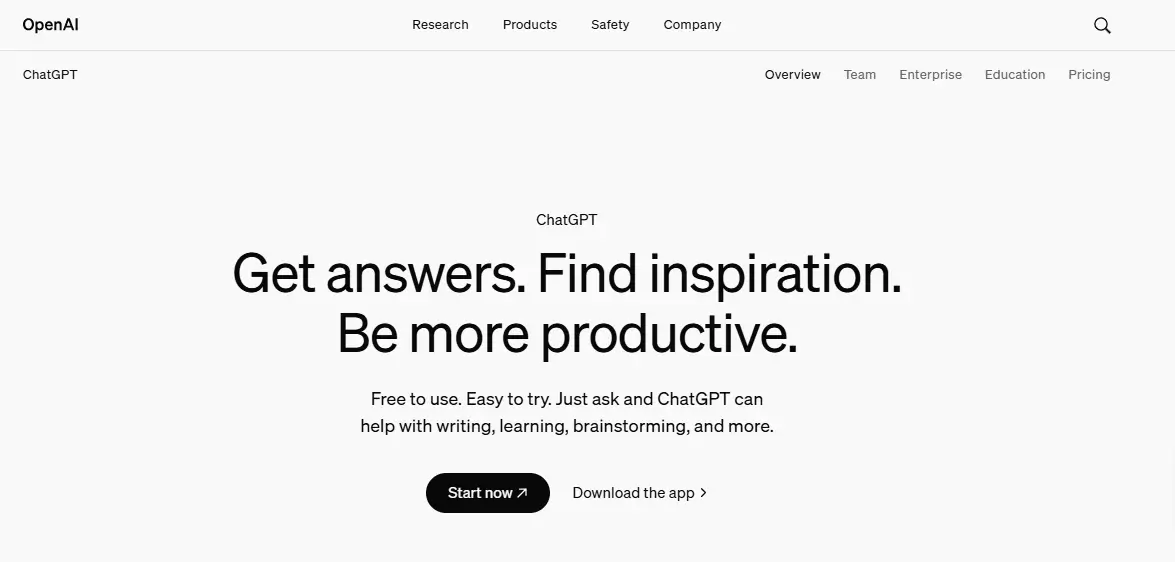
OpenAI’s ChatGPT is a widely recognized AI chatbot platform powered by advanced large language models. It’s a flexible solution for businesses looking to enhance customer interactions, automate repetitive tasks, and provide accurate responses across various channels.
Key Features
- Built on OpenAI’s GPT models, offering exceptional natural language processing capabilities.
- Supports multiple platforms and API integration for scalability.
- Offers no-code capabilities with options for developers to customize deeper integrations.
- Facilitates human-like interactions with a conversational tone.
Pros
- Accessible pricing, including a free plan for basic usage.
- Rich ecosystem of integrations and developer tools.
Cons
- Lacks pre-built templates for business-specific use cases.
Suitable For
Great for SaaS companies, customer service teams, and SMBs looking to adopt AI-powered automation.
Pricing
ChatGPT provides free and paid plans, with premium options starting at $20 per month.
Integration Capabilities
ChatGPT supports APIs, allowing businesses to use the platform for tailored solutions, connect it to internal knowledge bases, or develop custom workflows.
Unique Selling Point
OpenAI’s reputation and the platform’s ability to adapt to a range of business needs make it a top choice.
3. Ada
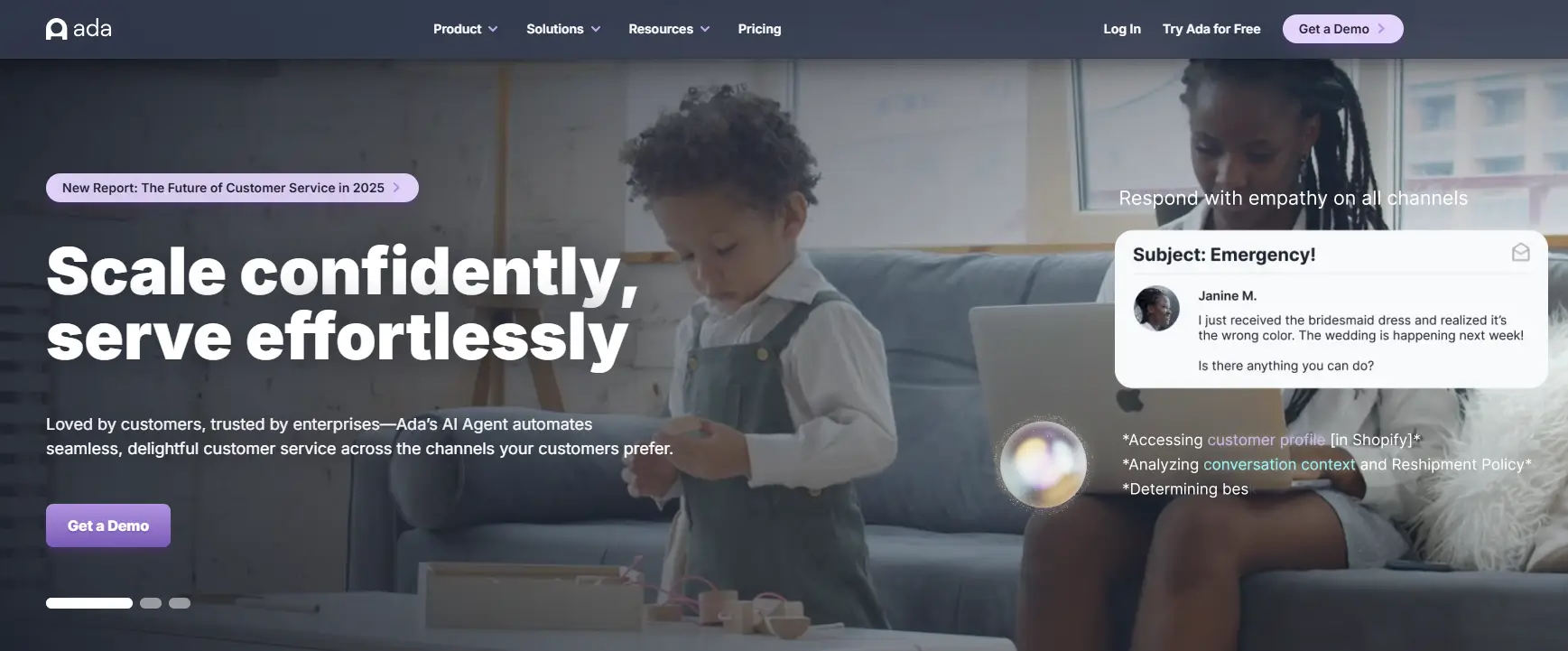
Ada is a robust AI chatbot platform designed to help businesses streamline customer support and enhance customer satisfaction. It emphasizes personalized customer experiences by tailoring conversations to the user’s intent.
Key Features
- Supports multilingual communication to engage a global audience.
- Customizable with no-code capabilities and advanced features for scaling operations.
- Offers analytics tools to optimize chatbot performance and user engagement.
Pros
- Strong focus on customer service operations.
- Excellent support for automating customer inquiries.
Cons
- Higher price point for advanced plans.
Suitable For
Perfect for e-commerce businesses and customer service teams looking for reliable tools to handle customer questions and improve user interactions.
Pricing
Ada provides custom pricing, but plans are geared toward mid-sized to enterprise businesses.
Integration Capabilities
Ada integrates with platforms like Facebook Messenger, CRM tools, and ticketing systems, ensuring seamless integration into existing workflows.
Unique Selling Point
Ada excels in delivering personalized interactions with a focus on creating meaningful engagement at scale.
4. Drift
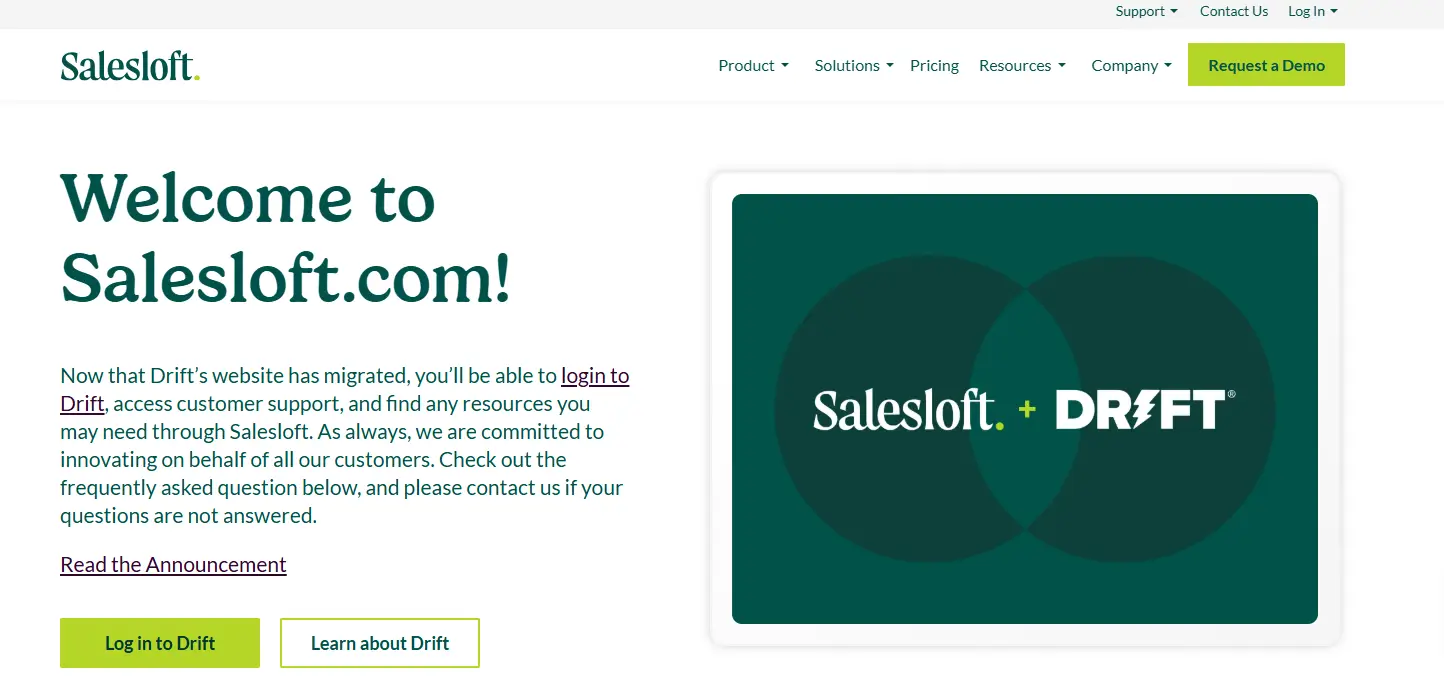
Drift is a conversational AI platform designed primarily for lead generation and customer support. With its focus on driving revenue, Drift helps businesses qualify leads and improve customer interactions through its powerful AI capabilities.
Key Features
- Tools for automating customer inquiries and qualifying sales leads.
- Advanced analytics for tracking conversions and user interactions.
- Options for integrating chatbots with live agents for more complex issues.
Pros
- Strong focus on lead qualification and sales enablement.
- Offers integration with major CRM platforms.
Cons
- May require technical expertise for advanced customization.
Suitable For
Well-suited for SaaS companies, customer support managers, and sales teams aiming to enhance customer experience while driving revenue.
Pricing
Drift offers tiered pricing, starting with a free trial and moving into custom plans for larger businesses.
Integration Capabilities
Seamless connections to tools like Salesforce, HubSpot, and email marketing platforms.
Unique Selling Point
Drift combines AI chatbots with human expertise, creating a hybrid solution for maximizing customer satisfaction and sales efficiency.
5. Tidio
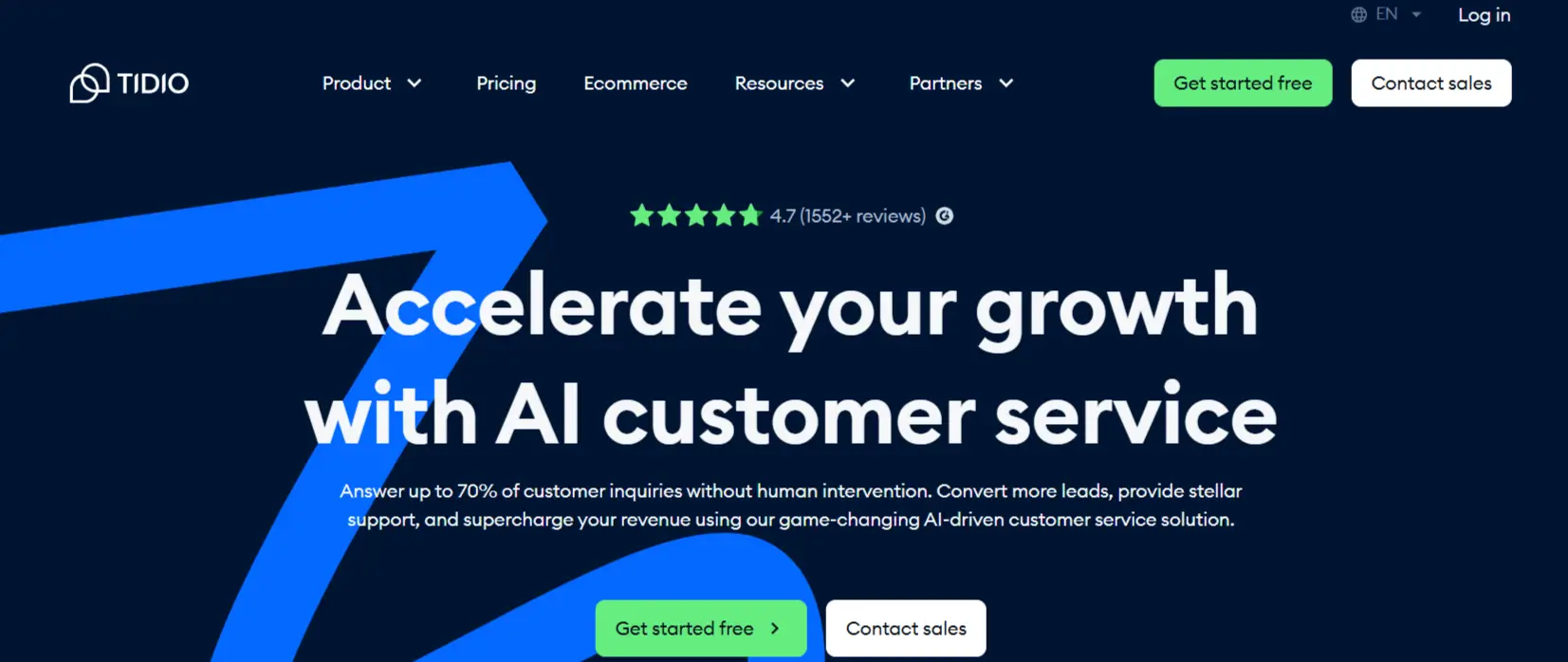
Tidio is a versatile AI chatbot platform designed for businesses of all sizes. It focuses on automating customer inquiries, improving user engagement, and driving customer satisfaction with its intelligent bots and live chat tools.
Key Features
- Pre-built templates for quick deployment.
- Supports multiple platforms, including websites, Facebook Messenger, and email.
- Real-time analytics to monitor chatbot performance and optimize workflows.
Pros
- Intuitive setup and user-friendly interface.
- Excellent for automating repetitive tasks in small businesses.
Cons
- Limited advanced features in lower-tier plans.
Suitable For
Ideal for SMBs, e-commerce businesses, and startups aiming to streamline customer interactions without a steep learning curve.
Pricing
Tidio offers a free plan, with premium plans starting at $19 per month.
Integration Capabilities
Easily integrates with Shopify, WordPress, and popular CRMs to enable seamless integration and improve functionality.
Unique Selling Point
Tidio’s pre-built templates and focus on simplicity make it a perfect choice for smaller teams with limited technical expertise.
6. Intercom
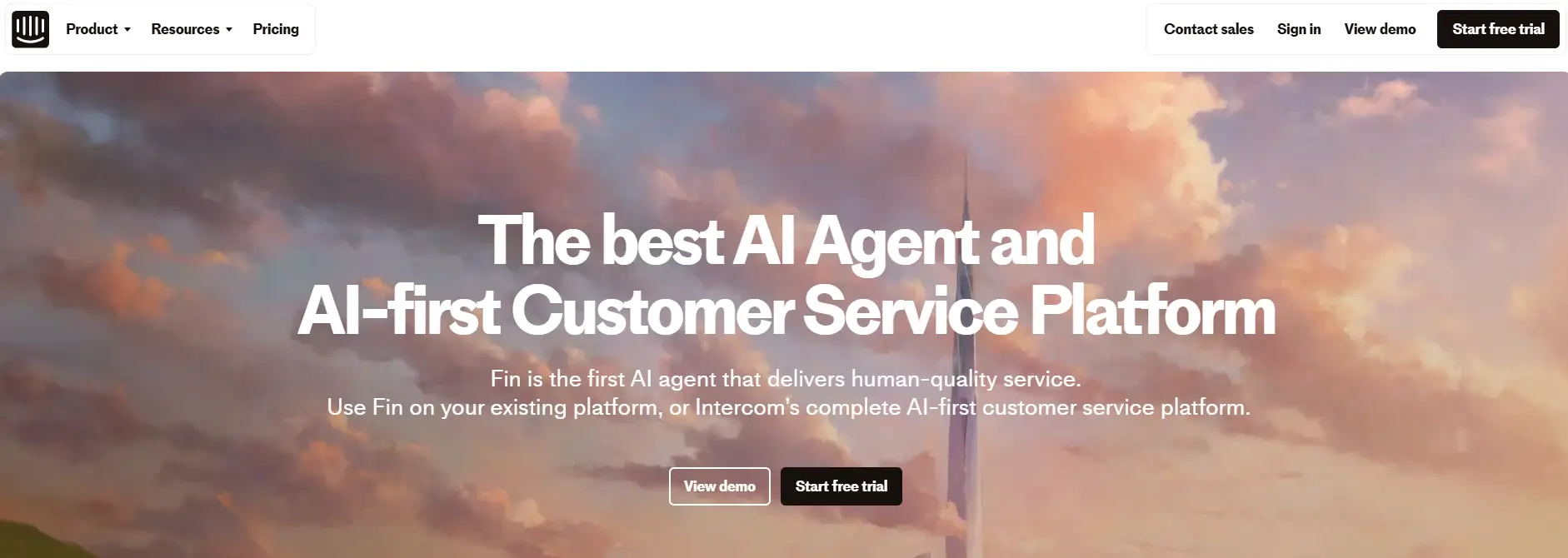
Intercom is a leading platform for conversational support, combining AI chatbots with live agent tools. It emphasizes personalized customer experiences, helping businesses deliver faster, more effective support.
Key Features
- Sophisticated AI models for handling customer inquiries.
- Ability to route complex issues to human agents seamlessly.
- Features for lead generation, customer support, and post-sales engagement.
Pros
- Comprehensive features for customer service operations.
- Strong focus on human-like interactions and personalized interactions.
Cons
- Premium pricing might be steep for smaller teams.
Suitable For
Well-suited for SaaS companies, customer service teams, and medium to large enterprises.
Pricing
Intercom offers customized pricing plans based on the features and scale required.
Integration Capabilities
Supports integration with CRMs, email marketing platforms, and internal knowledge bases to handle diverse business needs.
Unique Selling Point
Intercom excels at blending automation with human touch, making it highly effective for customer experience at scale.
7. Botpress
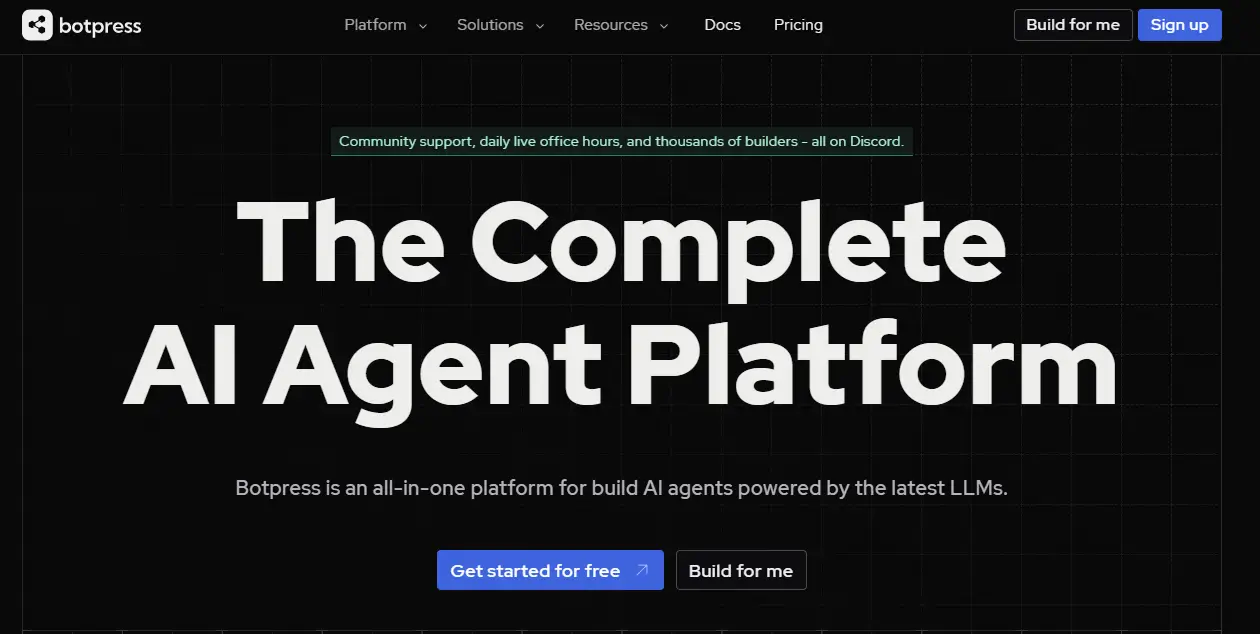
Botpress is an open-source AI chatbot platform designed for developers and businesses seeking full control over their bots. Its modular design supports deep customization, making it a favorite for advanced use cases.
Key Features
- Supports custom data and tailored workflows.
- Built-in natural language processing for relevant responses.
- Offers API access for developers to extend functionality.
Pros
- Full flexibility with no-code and developer-focused tools.
- Strong focus on data protection and scalability.
Cons
- Requires technical expertise to leverage fully.
Suitable For
Best for SaaS companies, large enterprises, and tech-savvy teams looking to build highly customized chatbots.
Pricing
Botpress offers a free open-source version and enterprise plans for advanced needs.
Integration Capabilities
Seamlessly connects with CRMs, internal knowledge bases, and multiple channels like Slack and Microsoft Teams.
Unique Selling Point
Botpress stands out for its open-source nature, allowing businesses to retain full control and adapt the platform to unique workflows.
8. Dialogflow
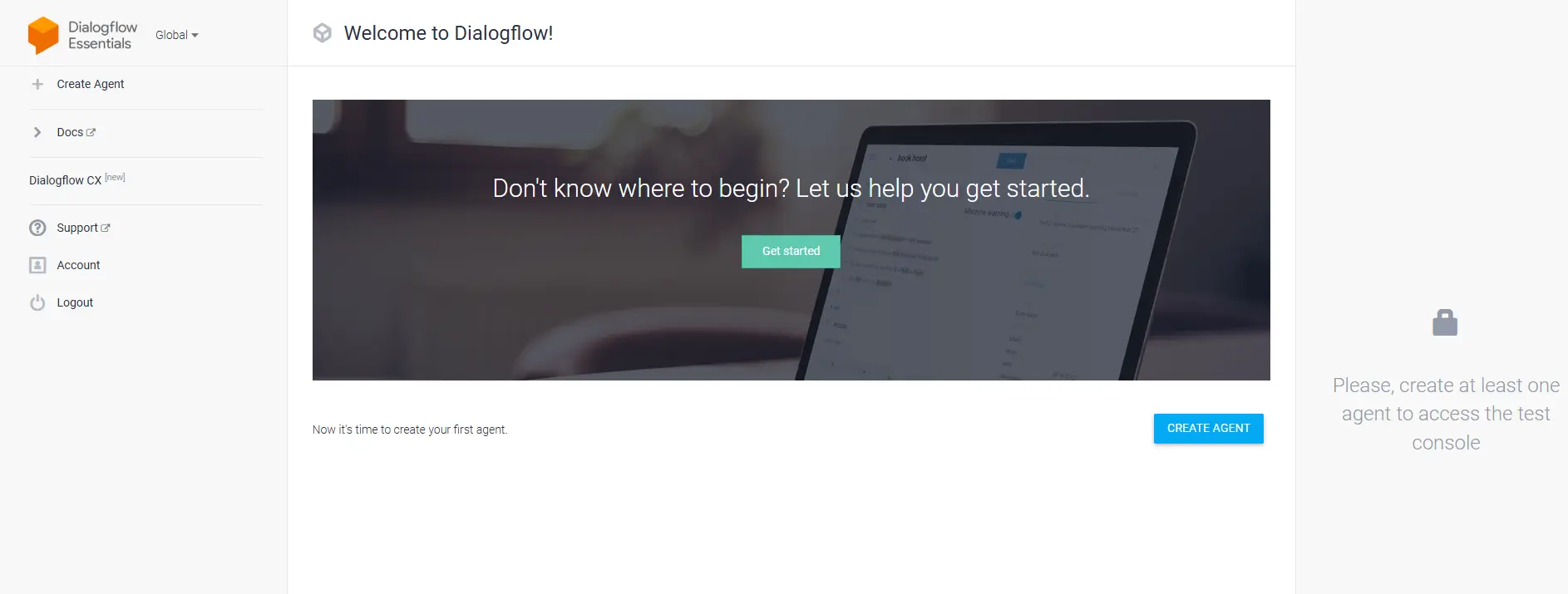
Dialogflow, powered by Google Cloud, is a versatile platform for creating conversational agents. It leverages advanced language models to provide relevant responses and can handle complex customer inquiries across multiple channels.
Key Features
- Built-in natural language processing for accurate and human-like interactions.
- Supports multiple platforms, including web, mobile apps, and voice assistants like Google Assistant and Alexa.
- Enables integration with internal knowledge bases for better customer support.
Pros
- Highly scalable for businesses with global ambitions.
- Robust developer tools and API access.
Cons
- Requires technical expertise for advanced setups.
Suitable For
Ideal for SaaS companies, customer service teams, and businesses targeting a global audience with multilingual needs.
Pricing
Offers a free trial and pay-as-you-go pricing based on usage.
Integration Capabilities
Integrates with a wide range of platforms, including CRMs, messaging apps, and Google Drive.
Unique Selling Point
Dialogflow’s deep integration with the Google ecosystem and its ability to create conversational agents for both text and voice make it a standout choice.
9. Zoho SalesIQ
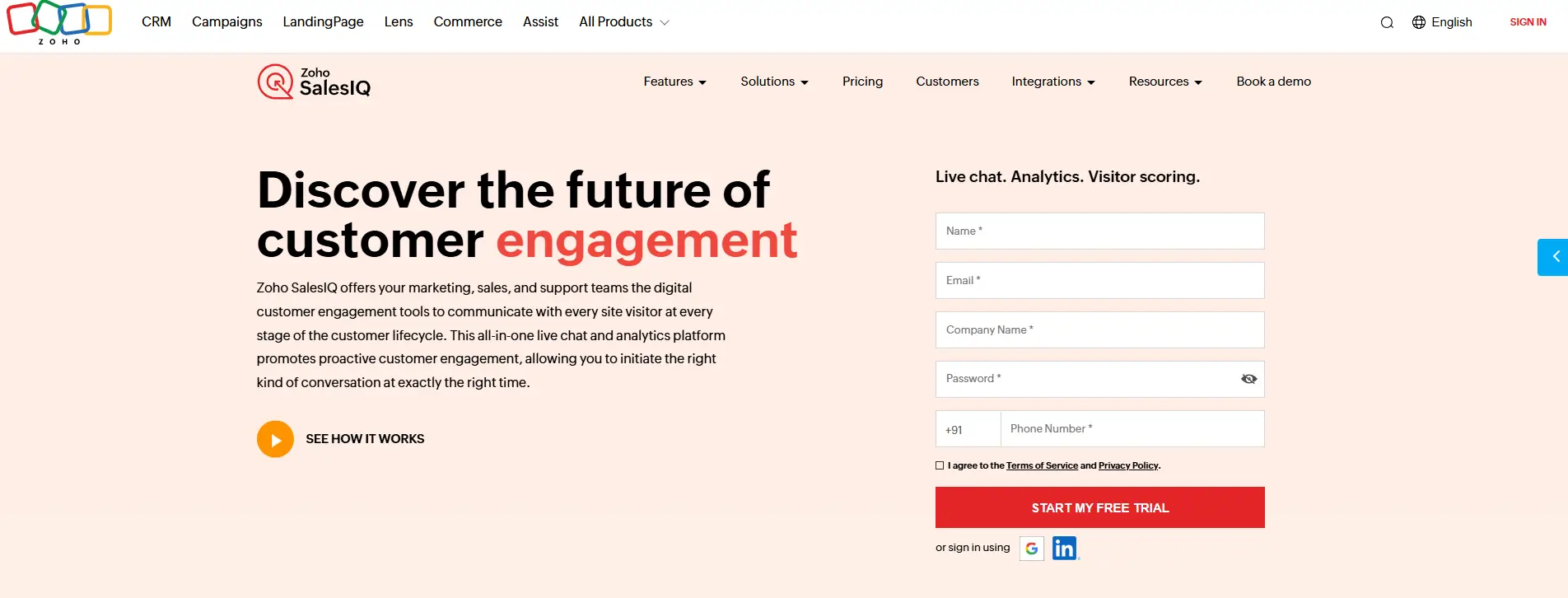
Zoho SalesIQ combines live chat and AI-driven chatbots to help businesses engage visitors, qualify leads, and enhance customer support. It’s an all-in-one tool designed to improve customer interactions and drive customer satisfaction.
Key Features
- AI-powered chatbots for automating repetitive tasks and providing instant answers.
- Real-time visitor tracking to identify potential leads.
- Customizable bots with no-code capabilities.
Pros
- Affordable plans tailored for small businesses.
- Excellent for lead generation and engaging customers in real time.
Cons
- Advanced features may require higher-tier plans.
Suitable For
Best for e-commerce businesses, customer service agents, and SMBs aiming to boost sales and support simultaneously.
Pricing
Starts with a free plan, with premium options for more advanced features.
Integration Capabilities
Works seamlessly with other Zoho products, CRMs, and popular platforms like WordPress and Shopify.
Unique Selling Point
Zoho SalesIQ offers a balance of affordability and functionality, making it a great fit for businesses looking for a reliable all-rounder.
10. ManyChat
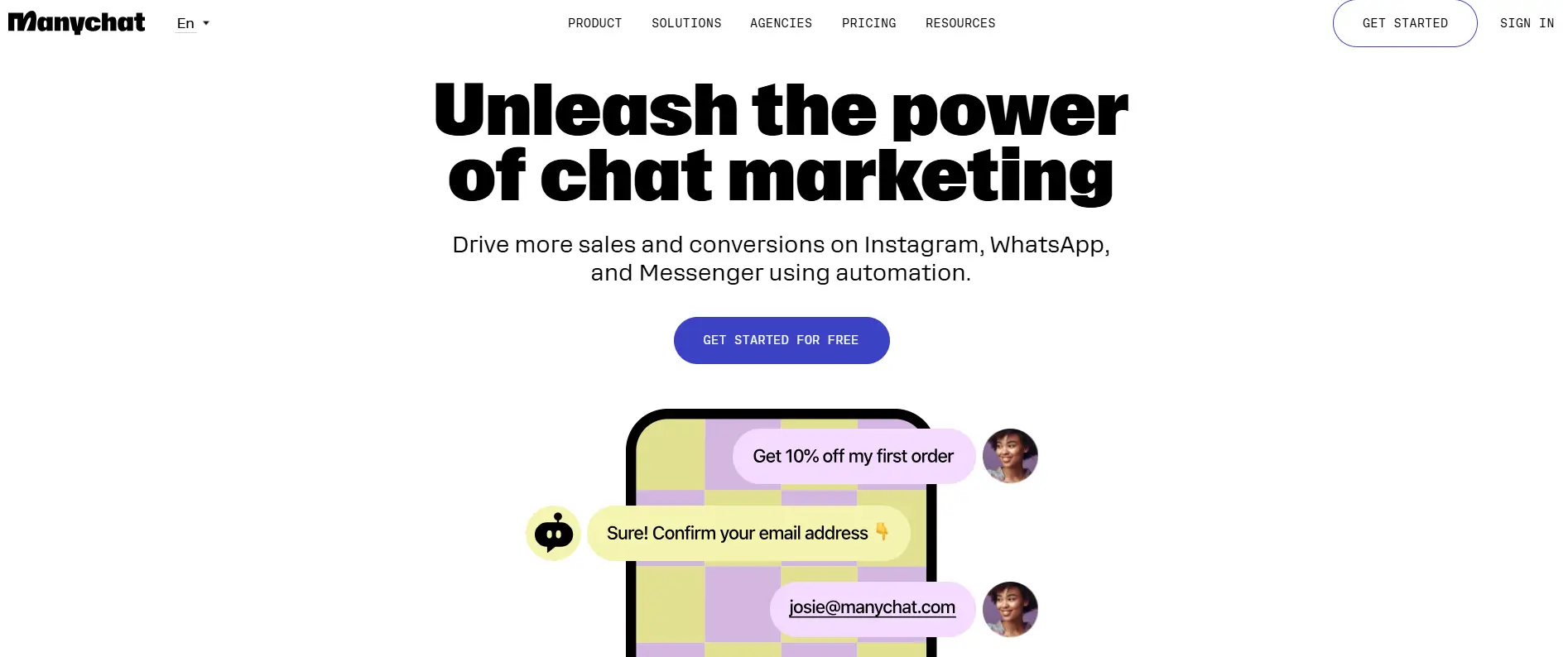
ManyChat is a popular chatbot platform focused on engaging audiences across messaging apps. It’s designed for businesses that want to simplify customer interactions while driving sales through conversational marketing.
Key Features
- Specialized in platforms like Facebook Messenger, Instagram, and WhatsApp.
- Offers personalized interactions to nurture leads and improve user engagement.
- Built-in analytics to measure chatbot performance and optimize campaigns.
Pros
- Simple interface and quick setup.
- Great for small businesses and e-commerce stores.
Cons
- Limited customization for complex workflows.
Suitable For
Ideal for e-commerce businesses, marketers, and customer service teams targeting global audiences on social platforms.
Pricing
Provides a free plan, with paid plans starting at $15 per month.
Integration Capabilities
Connects seamlessly with platforms like Shopify, Mailchimp, and CRM tools.
Unique Selling Point
ManyChat’s focus on social media platforms makes it the go-to choice for businesses wanting to connect with customers where they are most active.
How to Choose the Right Chatbot Platform
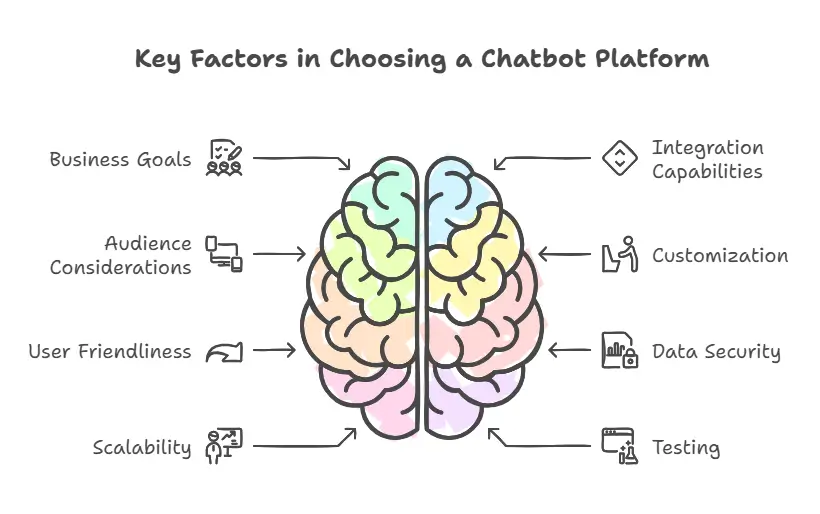
Selecting the best chatbot platform depends on your business needs and goals. With so many options available, it’s crucial to focus on the key factors that ensure long-term success. Here’s a guide to help you make the right decision:
1. Understand Your Business Goals
Start by identifying what you want to achieve.
- Is your goal to improve customer satisfaction?
- Do you need a chatbot for lead generation, automating conversations, or streamlining customer support?
- Are you looking for a tool to handle repetitive tasks or provide instant answers to customer questions?
Clear objectives will help narrow down your options.
2. Evaluate Integration Capabilities
Ensure the platform integrates seamlessly with your existing tools like CRMs, Microsoft Teams, Google Drive, or Facebook Messenger. This allows for smooth workflows and maximized productivity.
3. Consider Your Audience
If you serve a global audience, look for platforms offering multilingual support. For businesses heavily reliant on social media, platforms like ManyChat may be a better fit.
4. Customization and Personalization
The ability to tailor chatbots to your brand’s voice, use custom data, and deliver personalized interactions is essential for creating memorable customer experiences.
5. Prioritize User Friendliness
A user-friendly interface with no-code capabilities is invaluable for teams without technical expertise. It ensures faster onboarding and quicker deployment.
6. Assess Data Security
For businesses handling sensitive data, ensure the platform follows industry standards for data protection. Tools like Botpress excel in keeping your custom data secure.
7. Check Scalability
Think about future growth. Platforms with advanced analytics, AI capabilities, and scalability can adapt to changing demands as your business expands.
8. Test Before You Commit
Most platforms offer free trials or freemium plans. Use these to test the features, chatbot performance, and ease of use.
Conclusion
Choosing the right CustomGPT alternative can significantly impact your customer support operations and overall customer satisfaction. With options like Dialogflow for advanced AI, or ManyChat for social media engagement, there’s a platform to meet every specific business need.
The key is to focus on the key factors that matter most to your business—whether it’s seamless integration, multilingual support, or advanced features like analytics and personalization. Remember to test platforms with a free plan or trial to ensure they deliver the user engagement and efficiency you expect.
With the right AI chatbot platform, you can streamline customer interactions, automate repetitive tasks, and provide personalized customer experiences that align with your brand’s voice. Ultimately, this helps businesses enhance their customer experience, drive lead generation, and operate at a global scale.
Frequently Asked Questions (FAQs)
1. What is the best CustomGPT alternative for small businesses?
Platforms like Desku and ManyChat are excellent for small businesses. They offer no-code capabilities, affordable pricing plans, and features tailored to repetitive tasks and customer inquiries.
2. Which platform is best for multilingual support?
Desku and Dialogflow are top choices for businesses needing multilingual support to engage a global audience. Both platforms provide advanced tools for handling conversations in multiple languages.
3. Do these platforms work with existing tools like CRMs and Microsoft Teams?
Yes, most platforms, including Desku, Zoho SalesIQ, and Intercom, offer robust integration capabilities with CRMs, Microsoft Teams, and other tools.
4. Are there free plans available for these chatbot platforms?
Many platforms, such as Desku, Tidio, ChatGPT, and ManyChat, offer free plans with limited features, making it easy to test their functionality before committing to a paid plan.
5. How do these platforms ensure data security?
Most platforms prioritize data protection by following industry standards. For example, Botpress and Intercom emphasize security when dealing with custom data and sensitive information.
